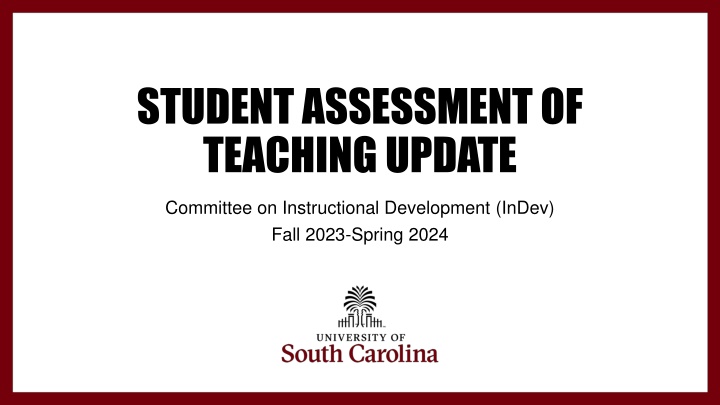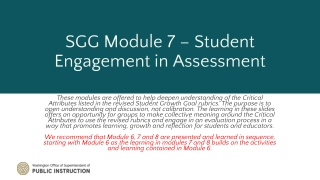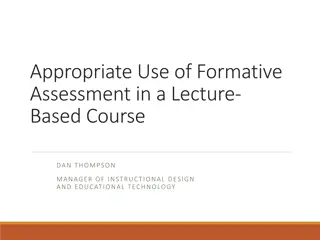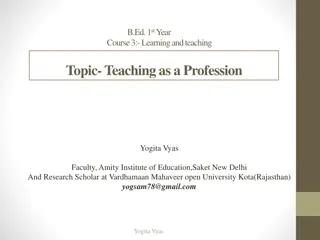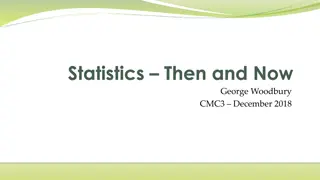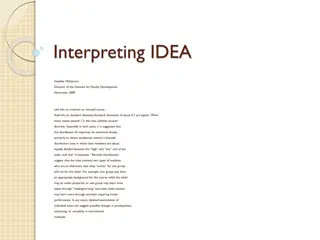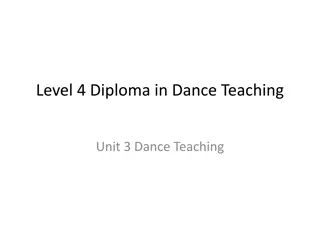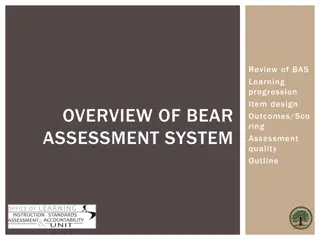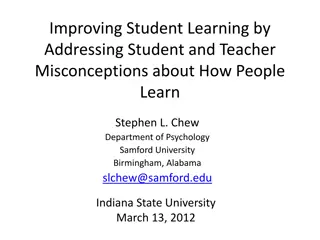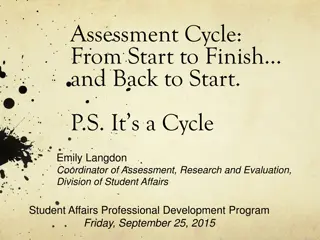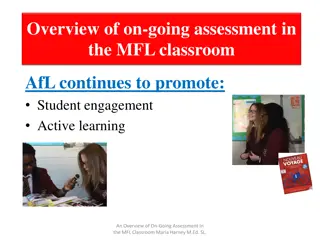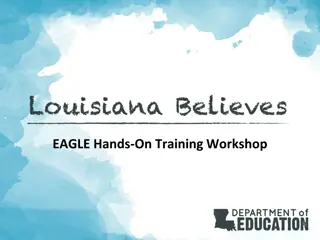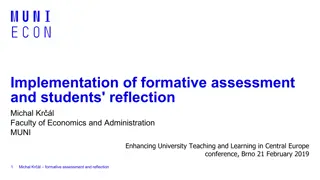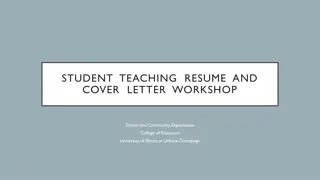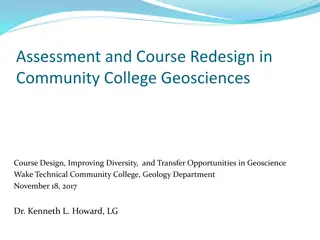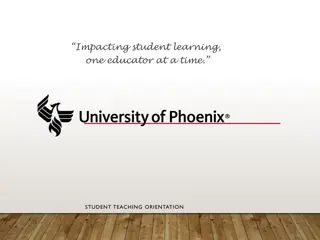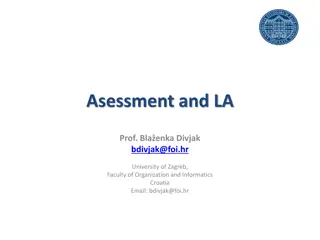STUDENT ASSESSMENT OF TEACHING UPDATE
Recommendations to increase course survey response rates, development of new university-wide course survey questions, and implementation of best practices in the assessment of teaching.
Download Presentation

Please find below an Image/Link to download the presentation.
The content on the website is provided AS IS for your information and personal use only. It may not be sold, licensed, or shared on other websites without obtaining consent from the author.If you encounter any issues during the download, it is possible that the publisher has removed the file from their server.
You are allowed to download the files provided on this website for personal or commercial use, subject to the condition that they are used lawfully. All files are the property of their respective owners.
The content on the website is provided AS IS for your information and personal use only. It may not be sold, licensed, or shared on other websites without obtaining consent from the author.
E N D
Presentation Transcript
STUDENT ASSESSMENT OF TEACHING UPDATE Committee on Instructional Development (InDev) Fall 2023-Spring 2024
STUDENT ASSESSMENT OF TEACHING Fall 2023 Recommendations for Increasing Course Survey Response Rates Participated in several faculty and student focus groups Delivered Recommendations to Office of the Provost Teaching Assessment Report Summary of consensus understanding of issues around conventional Student Evaluations of Teaching (SETs) Summary of recommendation of best practice for the assessment of teaching, including student assessment of teaching Course Survey Tools Review and Report Submitted to Office of the Provost
STUDENT ASSESSMENT OF TEACHING Spring 2024 Teaching Assessment Report Follow-Through Working to develop improved guidelines, policy, and manual language with representatives from: InDev University Committee on Tenure and Promotion University Committee on Professional-Track Faculty Course Survey Tool Procurement Process InDev Chair serves on procurement committee Procurement process now complete: contract with Explorance Blue
STUDENT ASSESSMENT OF TEACHING Explorance Blue: Is prepared to provide services that align with best practices in the assessment of teaching, including the integration of peer, student, and self- assessment. Allows for a high degree of customizability in terms of question development and deployment, and survey result metrics and dissemination (all according to the relevance to and needs of instructors, programs, colleges, etc.). Has a compelling set of tools to increase response rates for student surveys and allow for instructors and the University to survey students multiple times per semester. Hosts an annual conference on the use of their tool for assessment and is dedicated to research, innovation, and transparency, as well the dissemination of best practices.
STUDENT ASSESSMENT OF TEACHING Spring 2024 (continued) Develop New University-Wide Course Survey Questions (Ideally Five) Requested by Office of the Provost Reviewed Emergent Models In April 2024 provided the Office of the Provost with Draft Recommendations for Feedback: Two Alternatives for Questions, derived from: University of Oregon s Teaching Elements -based end-of-course survey Colorado State University s Teaching Effectiveness Framework Recommended Policies on Use of Student Feedback Surveys, derived from findings of Teaching Assessment Report
Teaching Effectiveness Framework PEDAGOGICAL CONTENT KNOWLEDGE is the intersection of content and pedagogical expertise. When instructors know their students prior knowledge and preconceptions, they intentionally choose instructional strategies that work best in their discipline for their current students. INCLUSIVE PEDAGOGY is a student-centered teaching approach that considers all students backgrounds, experiences, and learning variabilities. Instructors who ensure equitable access to course materials, foster belonging, and address the needs of a diverse student population create a more robust learning experience for all learners. STUDENT MOTIVATION is sparked by the perceived value or benefit of the academic content or task. When instructors use a variety of researched motivation techniques, student involvement and commitment to learning CURRICULUM/CURRICULAR ALIGNMENT provide the foundation for any course. Instructors who connect course learning objectives, assignments, activities, and assessments provide students with a clear path to success in their course. CLASSROOM CLIMATE refers to the intellectual, social, emotional, and physical environment in which students learn. Instructors who intentionally create a safe space and foster a community of learners find that students are more engaged. FEEDBACK & ASSESSMENT are used to continuously monitor performance and communicate progress and levels of mastery to students. Instructors who incorporate frequent and ongoing assessments are able to use these data to adjust teaching strategies and provide feedback to students about their learning, motivating students to be more self-directed. INSTRUCTIONAL STRATEGIES that are most effective provide an active and engaging experience for learners. Instructors who use a variety of evidenced-based teaching strategies create an environment for increased student engagement and critical thinking. Teaching Effectiveness Framework, Version 2.0.02 The Institute for Learning and Teaching (c) 2023 Colorado State University 2023 CC BY-NC-ND 4.0
STUDENT ASSESSMENT OF TEACHING Spring 2024 (continued) Develop New University-Wide Course Survey Questions (Ideally Five) Requested by Office of the Provost Reviewed Emergent Models In April 2024 provided the Office of the Provost with Draft Recommendations for Feedback: Two Alternatives for Questions, derived from: University of Oregon s Teaching Elements -based end-of-course survey Colorado State University s Teaching Effectiveness Framework Recommended Policies on Use of Student Feedback Surveys, derived from findings of Teaching Assessment Report
STUDENT ASSESSMENT OF TEACHING Recommended Policies: Students should be surveyed more than once, ideally at both the midpoint and the end of the semester. Student course survey questions should focus on student experiences, and survey instruments should be framed as an opportunity for student feedback, rather than an opportunity for formal ratings of teaching effectiveness. Instruments should be renamedto remove the term evaluation and to emphasize that student feedback, while important, is not an evaluation of teaching effectiveness. Student course surveys should not be used as the only evidence speaking to teaching effectiveness.Rather, when they are used, they should be used as part of a holistic assessment that includes consideration of the instructor s goals, peer observations, reviews of teaching materials, and instructor self-reflections. A University-level student course survey instrument may be useful for assessing the institution, but, in part due to the diversity of types of courses and disciplines, such an instrument should not be employed as a means of directly assessing individual instructors. Nor should student course survey results be substituted at the University-level for the holistic evaluation conducted by faculty peers.
STUDENT ASSESSMENT OF TEACHING Recommended Policies: At the unit level, and ideally at the individual level as well, faculty should be allowed to include survey questions approved by the unit and tailored to the discipline and course. Student course surveys should not be used to compare individual faculty members to each other or to a department average.As part of a holistic assessment, they can appropriately be used to document patterns in an instructor s feedback over time. Note, though, that this is distinct from use as direct evidence documenting patterns in teaching effectiveness. If quantitative scores are reported, they should include distributions, sample sizes, and response rates for each questionon the instrument to provide an interpretive context for the scores. Any evaluatorswho make use of student course survey results as evidence that speaks to teaching effectiveness for either formative or summative assessment should be trained in how to interpret and use student course surveys as part of a holistic assessment of teaching effectiveness.
STUDENT ASSESSMENT OF TEACHING Spring 2024 (continued) Develop New University-Wide Course Survey Questions (Ideally Five) Requested by Office of the Provost Reviewed Emergent Models In April 2024 provided the Office of the Provost with Draft Recommendations for Feedback: Two Alternatives for Questions, derived from: University of Oregon s Teaching Elements -based end-of-course survey Colorado State University s Teaching Effectiveness Framework Recommended Policies on Use of Student Feedback Surveys, derived from findings of Teaching Assessment Report Office of Provost expressed preference for CSU-derived questions and . . . Provided feedback for revision Recommended InDev conduct talk-backs with students to gather feedback Working working with InDev to set up pilots with units for Fall 2024
STUDENT ASSESSMENT OF TEACHING Draft Questions: 1. Course activities (e.g., assignments, assessments, etc.) helped me reach the learning objectives for the course. 2. The instructional methods and materials were engaging. 3. The course activities increased my knowledge and skills in the subject matter. 4. The instructor created a safe and inclusive learning environment for students. 5. The significance and relevance of the course topic(s) were made clear. 6. I received timely and meaningful feedback that helped me learn the course content. 7. How many hours per week did you dedicate to this course, both inside and outside of class meetings? Ratings Scale: Hardly Ever, Occasionally, Sometimes, Frequently, Almost Always
STUDENT ASSESSMENT OF TEACHING Spring 2024 (continued) Develop New University-Wide Course Survey Questions (Ideally Five) Requested by Office of the Provost Reviewed Emergent Models In April 2024 provided the Office of the Provost with Draft Recommendations for Feedback: Two Alternatives for Questions, derived from: University of Oregon s Teaching Elements -based end-of-course survey Colorado State University s Teaching Effectiveness Framework Recommended Policies on Use of Student Feedback Surveys, derived from findings of Teaching Assessment Report Office of Provost preferred CSU-derived questions Provided feedback for revision Recommended conducting talk-backs with students to gather feedback Working to set up pilots with units for Fall 2024
STUDENT ASSESSMENT OF TEACHING 2024-2025 (projected) Collaborate with Office of Provost on piloting and implementation of Explorance Blue Seek feedback from fall pilot, Faculty Senate, and stakeholders on draft questions Finalize question recommendations Continue collaborative work on updated guidelines, policies, and manual language
THANKS! Mark Minett Associate Professor of Film & Media Studies and English Outgoing Chair of Committee on Instructional Development minett@mailbox.sc.edu
